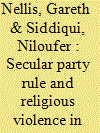| Srl | Item |
| 1 |
ID:
181552


|
|
|
|
|
| Summary/Abstract |
Migrants are politically marginalized in cities of the developing world, participating in destination-area elections less than do local-born residents. We theorize three reasons for this shortfall: migrants’ socioeconomic links to origin regions, bureaucratic obstacles to enrollment that disproportionately burden newcomers, and ostracism by antimigrant politicians. We randomized a door-to-door drive to facilitate voter registration among internal migrants to two Indian cities. Ties to origin regions do not predict willingness to become registered locally. Meanwhile, assistance in navigating the electoral bureaucracy increased migrant registration rates by 24 percentage points and substantially boosted next-election turnout. An additional treatment arm informed politicians about the drive in a subset of localities; rather than ignoring new migrant voters, elites amplified campaign efforts in response. We conclude that onerous registration requirements impede the political incorporation, and thus the well-being, of migrant communities in fast-urbanizing settings. The findings also matter for assimilating naturalized yet politically excluded cross-border immigrants.
|
|
|
|
|
|
|
|
|
|
|
|
|
|
|
|
| 2 |
ID:
158486


|
|
|
|
|
| Summary/Abstract |
Does secular party incumbency affect religious violence? Existing theory is ambiguous. On the one hand, religiously motivated militants might target areas that vote secularists into office. On the other hand, secular party politicians, reliant on the support of violence-hit communities, may face powerful electoral incentives to quell attacks. Candidates bent on preventing bloodshed might also sort into such parties. To adjudicate these claims, we combine constituency-level election returns with event data on Islamist and sectarian violence in Pakistan (1988–2011). For identification, we compare districts where secular parties narrowly won or lost elections. We find that secularist rule causes a sizable reduction in local religious conflict. Additional analyses suggest that the result stems from electoral pressures to cater to core party supporters and not from politician selection. The effect is concentrated in regions with denser police presence, highlighting the importance of state capacity for suppressing religious disorder.
|
|
|
|
|
|
|
|
|
|
|
|
|
|
|
|